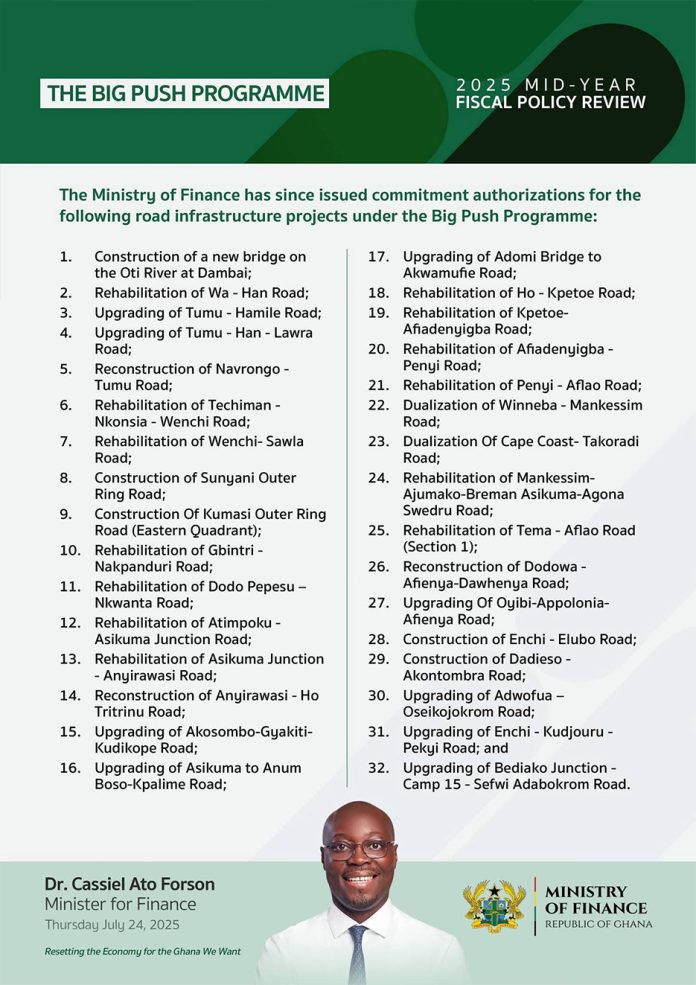Finance Minister, Dr. Cassiel Ato Forson, has disclosed that the Mahama government inherited uncontrolled spending from the previous New Patriotic Party (NPP) government.
Delivering the Mid-Year Budget Review in Parliament on Thursday, July 24, 2025 he said, “We inherited uncontrolled spending. The budget deficit had ballooned because of reckless commitment and wasteful spending.
“The indebtedness of the government had culminated in state insolvency. The impaired balance sheet paralyzed almost every single state enterprise.”
According to the Finance Minister, the government inherited a derailed IMF program, massive energy sector debts exceeding $1.5 billion annually, over GH₵194 billion in contract arrears and empty financial buffers, including a depleted Stabilisation Fund.
He revealed that the economy’s foundation had been so deeply eroded that it risked total collapse without urgent structural reforms.
DDEP Fallout
Dr. Ato Forson pointed to the controversial Domestic Debt Exchange Programme (DDEP), which he said stripped Pensioners and middle-class Ghanaians of their lifetime savings and dignity.
He lamented that Eurobond holders also suffered “painful haircuts,” severely impacting businesses and the financial sector.
“Public sector corruption reached an all-time peak. Investor confidence waned considerably, and the public debt reached unsustainable levels,” he emphasised.
He noted that the Ghana cedi had, under the previous government, become the “worst performing currency in the world,” contributing to spiralling inflation and unbearable cost of living.
Additionally, Ghana received unprecedented downgrades from all three major credit rating agencies, plunging the country into default and what he described as “junk territory never seen in our history.”
Quoting former U.S. President Barack Obama, the Finance Minister said “The whole of Ghana was indeed a crime scene.”
He accused the past administration of poor coordination between the Ministry of Finance and the Bank of Ghana, resulting in excessive monetary financing, skyrocketing inflation, and complete policy chaos.
“There was no cohesion, no plan just chaos. It was the highest level of incompetence in economic management ever witnessed in this country,” he said.
Despite the economic wreckage, Dr. Ato Forson said President John Dramani Mahama’s government made a deliberate choice not to apportion blame but to “reset the country.”
This began with a National Economic Dialogue and wide consultations with civil society, market women, youth, trade unions and traditional authorities.
The Minister declared, “We renewed our social contract with the Ghanaian people. We redefined national priorities and adopted a deliberate and measured approach to economic management.”
The Mahama-led administration, he said, launched a new economic model aimed at fiscal discipline without cutting back on essential social spending.
Measures included the passage of Act 1140 to establish the Ghana Gold Board to help stabilize the currency, and restoring collaboration between the Ministry of Finance and the Bank of Ghana for unified policy direction.
Tangible Gains in Six Months
Dr. Cassiel Ato Forson told Parliament that the reforms were already paying off.
- Inflation has dropped from 23.8% in December 2024 to 13.7% in June 2025, marking six consecutive months of decline and the lowest rate since 2021.
- The cedi appreciated 42.6% against the Dollar, 30.3% against the Pound, and 25.6% against the Euro – a reversal of three years of losses.
- T-bill rates fell drastically across all maturities, with the 91-day rate dropping from 27.73% to 14.73%.
- Gross International Reserves increased to $11.12 billion, covering 4.8 months of imports, up from $8.98 billion.
- Ghana’s primary balance recorded a surplus of 1.1% of GDP by June 2025, outperforming the targeted 0.4%.
- The overall fiscal deficit stood at 0.7% of GDP, better than the expected 1.8%.
Credit Ratings
The Finance Minister said international confidence was returning. On June 17, 2025, Fitch Ratings upgraded Ghana’s long-term foreign currency rating to B- with a stable outlook, a significant improvement from its previous restricted default rating.
Additionally, the IMF Board successfully completed its fourth review of Ghana’s program on July 7, resulting in the immediate release of $367 million in disbursements.
“This is a story of sound leadership. We have brought back clarity, certainty, stability and purpose to our economic policy direction in 200 days,” Dr. Ato Forson asserted.









